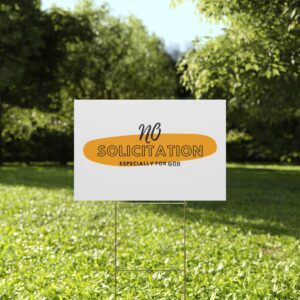 Welcome to our comprehensive guide on “No Soliciting Signs.” Maintaining privacy and control over who visits your property is paramount as a property owner. Our FAQ will enlighten you on the purpose and significance of these signs, ensuring you understand their meaning and the implications for visitors. Learn about exceptions, enforcement options, and how to handle potential violations confidently. With our expert insights, you can take charge of your property and create a peaceful environment.
Welcome to our comprehensive guide on “No Soliciting Signs.” Maintaining privacy and control over who visits your property is paramount as a property owner. Our FAQ will enlighten you on the purpose and significance of these signs, ensuring you understand their meaning and the implications for visitors. Learn about exceptions, enforcement options, and how to handle potential violations confidently. With our expert insights, you can take charge of your property and create a peaceful environment.
“No Soliciting” signs are more of a polite request than a legally binding directive. In residential areas, they primarily serve as a deterrent to unwanted visitors like salespeople and canvassers. While ignoring these signs can sometimes lead to trespassing charges, this depends on local laws and enforcement. The signs carry a bit more weight in commercial settings, and ignoring them can be grounds for a trespassing complaint. However, certain groups, such as political canvassers and religious organizations, might still be allowed to knock due to free speech protections. Always check your local ordinances for specific regulations.
No solicitation signs can be purchased at most hardware stores or online. Custom signs can also be made to meet specific requirements or preferences.
In many areas, no solicitation signs are legally enforceable under local laws that regulate door-to-door solicitation. Violating these signs can be considered trespassing. However, enforcement can vary by location, so it’s recommended to check local laws.
No solicitation signs should be posted in clear view at all property entry points. This includes front doors, driveways, or main entrances to buildings to ensure they are visible to all potential solicitors.
A no solicitation sign is a notice typically posted on private property to inform visitors that soliciting, including selling goods or services, distributing flyers, or collecting donations, is not permitted on the premises.
In some cases, local authorities, such as your city or town or even the police department, may be responsible for enforcing such regulations. Documenting the incident with details such as the time, date, and description of the individual or company involved can help report and address the issue effectively.
Always check your local ordinances for specific regulations. For more information, we offer resources for many major cities on our website at https://knock-block.com/resources.
If in doubt, it’s best to respect the property owner’s wishes and refrain from engaging in any commercial or promotional activities unless explicitly invited.
While “no solicitation” signs primarily pertain to in-person interactions, they may also signal a preference for no contact via phone or email for sales purposes.
Typically, “no solicitation” signs encompass all forms of commercial or promotional activities, including distributing flyers or advertising.
Yes, there are various designs and messages for “no solicitation” signs. Some may specify no salespeople, while others may include no religious or political canvassing.
Ignoring a “no solicitation” sign may result in being asked to leave the property by the owner or management. In some cases, it could lead to legal consequences, especially if local ordinances are violated.
Yes, “no solicitation” signs typically don’t prohibit social visits. They mainly apply to commercial or promotional activities.
Some organizations may be exempt, such as religious groups, political campaigners, or charities. However, it’s essential to respect the property owner’s wishes and any local regulations.
Anyone intending to engage in commercial or promotional activities on the property, including salespeople, canvassers, and fundraisers.
Property owners often post these signs to maintain privacy, avoid interruptions, and control who has access to their premises.
“No solicitation” means that individuals are not allowed to sell goods or services, promote causes, or request donations on the property.